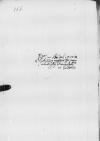List #2132
Ioannes DANTISCUS do Tiedemann GIESEHeilsberg (Lidzbark), 1539-04-12
Regest polski:
Dantyszek cieszy się z zawartej w liście Giesego deklaracji przyjaźni oraz lojalności w sprawie Aleksandra [Scultetiego] i zapewnia o swojej nieodmiennej życzliwości.
W momencie nadejścia listu Giesego [11 kwietnia] Dantyszek odbywał naradę z kasztelanem gdańskim [Achacym Cemą]. Obu im spodobało się stanowisko Giesego oraz rady Torunia. Kasztelan zobowiązał się rozmawiać z tych pozycji z księciem [Albrechtem Hohenzollernem], do którego wyruszył następnego dnia.
Z powodu pojawienia się zarazy w Malborku uznali za wskazane, by zwrócić się do króla [Zygmunta I], aby wskazał inną lokalizację i realny termin najbliższego sejmu [pruskiego], np. na niedzielę Trójcy [1 czerwca] w Elblągu. Dantyszek prosi Giesego o przekazanie tej informacji innym senatorom [pruskim].
Fabian [Cema] przekazał z Krakowa swemu bratu [Achacemu] nowiny przywiezione na dwór przez posła króla rzymskiego [Ferdynanda]: cesarz [Karol V] i król Francji [Franciszek I] wyruszyli wspólnie z ogromną flotą przeciw sułtanowi [Sulejmanowi Wspaniałemu], by — jak głoszą plotki — odzyskać Rodos. Informację tę potwierdził w liście do Dantyszka elekt lundzki i konstancki [Johann Weze]. Obecnie podąża on na sejm [Rzeszy] we Frankfurcie jako komisarz generalny cesarza w sprawach religii, pełen nadziei na zakończenie konfliktów wyznaniowych.
Dantyszek uważa za wskazane zarządzenie w diecezjach [chełmińskiej i warmińskiej] modłów w intencji powodzenia wyprawy przeciw sułtanowi.
Rękopiśmienne podstawy źródłowe:
Publikacje:
| ||||||||
Tekst + aparat krytyczny + komentarz Zwykły tekst Tekst + komentarz Tekst + aparat krytyczny
Reverendissimo in Christo Patri Domino, domino
Reverendissime in Christo Pater et Domine, frater et amice carissime et honoran(de) or honoran(dissime)⌈honoran(de)honoran(de) or honoran(dissime)⌉.
Salutem et fraternum amorem.
Non mediocriter me exhilararunt Dominationis Vestrae Reverendissimae cf.
Cum mihi heri[1] cf.
In hoc turbulento tempore Deus laeta quaedam nobis dedit nova: dixit dominus
Habui item paulo ante cf.  BCz, 245, p. 164 generali ms. generalem(!)
⌈generaligenerali ms. generalem(!)
⌉, quod in causa religionis per dispositos equos a
BCz, 245, p. 164 generali ms. generalem(!)
⌈generaligenerali ms. generalem(!)
⌉, quod in causa religionis per dispositos equos a
Quod si ista
Quod reliquum est, Dominationem Vestram Reverendissimam diutissime optime et feliciter valere opto ex animo. Quae sibi de me atque de sincero fratre cuncta semper persuadeat.
Dat(ae) or Dat(um)⌈Dat(ae)Dat(ae) or Dat(um)⌉
Dominationis Vestrae Reverendissimae frater integerrimus


